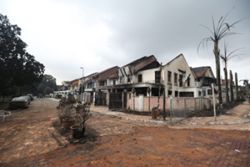
PETALING JAYA: Industry observers are largely optimistic about the impending introduction of the Corporate Renewable Energy Supply Scheme (CRESS) in September, despite its lack of details at this juncture.
Analysts and fund managers say the initiative is a move in the right direction in freeing up Malaysia’s renewable energy (RE) market, as the country accelerates along its commitment towards enforcing the National Energy Transition Roadmap (NETR).
The CRESS, which was announced by the Energy Transition and Water Transformation Ministry last Friday, enable RE generators and eligible corporate users to enter into green power supply arrangements under agreed terms through the existing supply system.
This would allow companies to directly source RE from identified providers with third-party access (TPA) to the existing electricity grid that are participating in the New Enhanced Dispatch Agreement market.
Tradeview Capital fund manager Neoh Jia Man believes that CRESS will positively impact the Malaysian energy sector by effectively opening up the power grid of Tenaga Nasional Bhd to TPA, although there remains details to be ironed out next month by the Energy Transition and Water Transformation Ministry.
to TPA, although there remains details to be ironed out next month by the Energy Transition and Water Transformation Ministry.
“This will further lower the barriers to entry into the renewable power generation sector, aiding our nation in achieving the goal of RE providing 40% of our needs by 2035,” he said in a reply to StarBiz.
In addition to electricity generators, he said companies involved in supplying and constructing related energy infrastructure should also benefit from the rollout of CRESS.
In a note to clients, CGS International Research (CGSI Research) said the unfurling of the scheme further reinforced its optimism for the government’s commitment and swift implementation of the NETR.
It said it is encouraged by the quick and timely follow-through by Putrajaya of key initiatives that include the massive 2.8 gigawatt new solar capacity quota and energy exchange as well as good progress on flagship projects announced under the NETR, all within a span of 11 months.
It predicted TNB – through its grid upgrade requirements and upside potential from its TNB Power Generation Sdn Bhd business from the RE capacity – as well as Genetec Technology Bhd as the potential key beneficiaries of the CRESS implementation.
as the potential key beneficiaries of the CRESS implementation.
“We maintain ‘overweight’ on Malaysian utilities as we believe the NETR has introduced a structural growth element to a sector that has traditionally been viewed as largely defensive,” said CGSI Research.
RHB Research said aside from being a progressive step towards industry reform that leads to a more liberal and competitive market, CRESS presents an opportunity for existing independent power producers to sell their output to new clients after the expiration of their existing power purchase agreements.
The research firm believes this could attract more players to become green energy power producers, with the ability to negotiate direct pricing for green electricity.
It said CRESS will also provide companies with the flexibility in choosing their energy sources, helping them meet environmental, social and governance sustainability targets.
“Furthermore, the initiative offers the ability to hedge against future fluctuations in green electricity rates. We view this as a highly positive development, as the programme will significantly increase the adoption of green energy,” it said.
As such, RHB Research expected CRESS to benefit solar engineering, procurement, construction and commissioning (EPCC) players by boosting their commercial and industrial orders.
Likewise, while maintaining a “neutral” call on the utilities sector, given the industry’s strong price performance and stretched valuations, MIDF Research said it favoured the RE EPCC sub-sector as the key immediate-term beneficiaries of the RE initiatives.
This is because prior to the commercial operation date (COD) of Large Scale Solar 5 plants in 2026, industry players will be kept busy by the development of Corporate Green Power Programme (CGPP) plants, which are expected to come on stream next year, based on the COD deadline set by the Energy Commission.
“A total of 800MW capacity was awarded under the CGPP, potentially giving rise to RM2.4bil to RM3.2bil worth of EPCC jobs this year. This is expected to be followed by the LSS5 construction in 2025, which based on the 2GW capacity allocated, could give rise to a much larger RM6bil to RM8bil prospective EPCC jobs,” it said.
Meanwhile, Neoh opined that the key challenge ahead for CRESS is the structure of the System Access Fee (SAF).
He said RE generators who are unable to provide firm supply will pay a higher SAF, and if the difference is significant, these generators may need to invest in energy storage facilities, which would result in higher tariffs charged to customers.
“Given the cost of energy storage, we believe the tariffs under CRESS might not be as competitive compared to other RE schemes.
“Nonetheless, we believe this arrangement is fair, as corporations would bear the true cost of RE rather than shifting the burden of grid balancing to TNB,” he said.
CGSI Research sees any derailment of the NETR or unfavourable regulatory shifts as the downside risks to the CRESS initiative, while RHB Research cautioned against lower-than-expected new RE capacity rollout and higher-than-expected operating costs for the corporations involved.
On top of TNB and Genetec, CGSI Research has also identified Malakoff Corp Bhd as its top picks should the CRESS be put in place without hiccups.
Samaiden Group Bhd stands out as the stock of choice for both RHB Research and MIDF Research.
Other counters that are deemed to benefit from the CRESS are Sunview Group Bhd and YTL Power International Bhd
and YTL Power International Bhd .
.









































